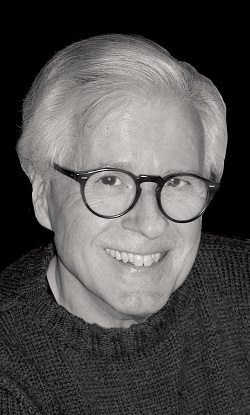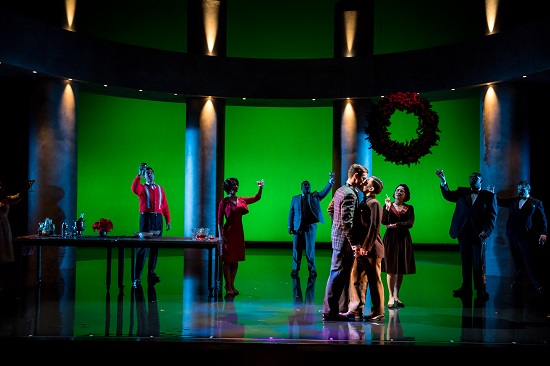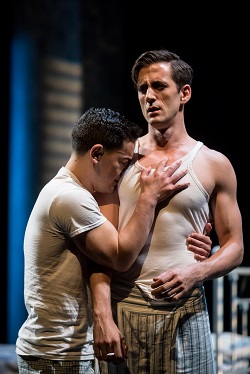In addition to producing the opera Fellow Travelers, Boston Lyric Opera will partner with WBUR for an evening with author Thomas Mallon, composer Gregory Spears and director Peter Rothstein in its new CitySpace on Tuesday, November 12 at 6:30pm. Moderated by Boston University Music Professor Phyllis Hoffman, tickets are just $10, and available here. Veteran music writer and critic Richard Dyer recently spoke to Mallon about writing the historical novel, and the impressive career he’s forged with stories on the periphery of history.
Author Thomas Mallon was a guest of honor at the party following the premiere of Gregory Spears’s opera Fellow Travelers at the Cincinnati Opera three years ago, and he should have been. Back in 2007 he published the poignant and disturbing novel of the same name from which Greg Pierce developed the libretto.
On that occasion Mallon was puzzled by how many young people involved in the production had come up to him, shaken his hand with fervor, and said it was such an honor to meet him. “This was very touching and sweet, but I didn’t quite understand it until Bill, my partner, said, ‘They think that the book and the opera are your story,’ and of course it wasn’t. I was born in 1951, so I was three years old at the time of the McCarthy hearings. When I was first making notes for the book, I gave one of my protagonists my own birthday – but a full 20 years earlier! Among other things the book is about what my life could have been like if I had been born back then.”
 Mallon, as you would expect, is a lively conversationalist, even when talking to a complete stranger interviewing him on the telephone. Pictures of Mallon appear on most of his dustjackets and they document his progress from a thick haired young man with an impish grin to an emergent Old Master, with a white froth of hair, an unlined face, and the same impish grin. There is a wicked vein of humor nourishing Mallon’s books – and conversation.
Mallon, as you would expect, is a lively conversationalist, even when talking to a complete stranger interviewing him on the telephone. Pictures of Mallon appear on most of his dustjackets and they document his progress from a thick haired young man with an impish grin to an emergent Old Master, with a white froth of hair, an unlined face, and the same impish grin. There is a wicked vein of humor nourishing Mallon’s books – and conversation.
Fellow Travelers, the novel, chronicles the tumultuous emotional and sexual relationship between two young men in the era of “the lavender scare” in the early 1950s. Senator Joseph McCarthy charged that communists and homosexuals had infested the government and posed serious security risks to the nation. He may not have believed this himself, but his unprincipled crusade gave him political clout and a power that he wantonly used to destroy lives.
The novel provides a detailed and meticulously researched framework for his two principal figures, Timothy Laughlin and Hawkins (“Hawk”) Fuller. Tim is a recent devoutly Catholic graduate of Fordham who is looking for a job in government; Hawk, a little older, already works in the State Department. Hawk spots Tim on a park bench, introduces himself, and the two talk for a while. Subsequently Hawk recommends Tim for a speechwriting position in a Senator’s office. They develop a passionate relationship, but Hawk always keeps his emotional distance. This ultimately forces Tim to enlist in the Army – he needs to get away from Hawk. But when he returns to Washington, he is still in love and says so. Hawk, by now married, replies that he too is in love. But he cannot live with that knowledge and admission, so in a monstrous act betrays Tim – and himself.

Mallon spent countless hours in libraries poring over books, transcripts, and newspaper microfilm researching the period and the novel is solidly anchored in historical realities and alertly studded with convincing ephemeral details. “I started out trying to write a nonfiction book exploring the McCarthy hearings at the time of the 50th anniversary of that event. I was very curious about Fred Fisher, a young lawyer who was involved in the hearings. It was in response to an attack on Fisher by McCarthy that attorney Joseph Welch delivered his famous rebuke. ‘Have you no sense of decency, sir? At long last, have you no decency?’”
On that occasion the gallery burst into applause and this was the beginning of McCarthy’s fall. Decades later, at every showing of Point of Order, a documentary about the hearings, audiences in the Orson Welles cinema in Cambridge were still applauding.
“I’ve always been interested in people who were on the periphery of great events, like Fred Fisher was,” Mallon says. “He died in 1989 after a prominent career in Massachusetts, but I wasn’t able to get anywhere with his life after the hearing, so this other narrative began to develop in my mind. This sort of thing has happened to me a bunch of times. In 2003 I moved to Washington, D.C. to teach and to work as deputy chairman of the National Endowment for the Humanities, so my experience as a bureaucrat in a later era figured into the story. The strange narrow house in Foggy Bottom where I lived even became the love nest for Hawk and Timothy.”
In those years Mallon’s office was in the old Post Office premises. As he was working on the novel he was given a tour of the whole building – a crucial scene is set there. Now it has been configured at a Trump Hotel. “When I saw that for the first time I almost gasped!”
In an afterword to the book Mallon admits that his novel ventures “farther than usual into my own life’s preoccupations and fundamentals, however refracted they might be here by time and geography.” So in fact some of his own life appears in Tim Laughlin’s life – “his grandmother is a hideous caricature of a member of my own family” – as well as in Hawk’s. “I am closer to Tim than to Hawk – I grew up in Tim’s world and in Tim’s parish. But then I became a scholarship student at Brown University and met people with background and pedigrees. I experienced the yawning gap between the two men because I had a foot in both worlds.”
 Productions of the opera have often tilted towards Tim’s point of view, but a recent one favored Hawk. “I am always surprised to hear Hawk described as a terrible person. He’s a victim too – he has his own set of skills, a WASP background, good looks, that allow him to navigate through the world in a way very different from Timothy. But Tim is the braver of the two of them because he leads with his heart. Most of the time Hawk is protective. I hate it when he is described as ‘predatory’ and promiscuous. That’s not how I ever thought of him. He is highly sexualized, but I like the old joke that a promiscuous person is anyone who has had one more partner than you have!”
Productions of the opera have often tilted towards Tim’s point of view, but a recent one favored Hawk. “I am always surprised to hear Hawk described as a terrible person. He’s a victim too – he has his own set of skills, a WASP background, good looks, that allow him to navigate through the world in a way very different from Timothy. But Tim is the braver of the two of them because he leads with his heart. Most of the time Hawk is protective. I hate it when he is described as ‘predatory’ and promiscuous. That’s not how I ever thought of him. He is highly sexualized, but I like the old joke that a promiscuous person is anyone who has had one more partner than you have!”
The idea that there might be an opera based on Fellow Travelers came from the librettist, Greg Pierce. “I knew him – he was a young fiction writer and playwright in New York whose work had enjoyed several successful productions. He was clearly already going places. He came to me in 2009 and asked me if I would be interested in an operatic adaptation. A stage director Kevin Newbury was already involved and G. Sterling Zinsmayer agreed to be the producer. They contacted my agent in New York and took an option on the book. The composer became attached to this later and the piece was in development for several years – workshops, a fundraising event, a sample at the annual Opera America Conference. Only then did I realize that was a coherent project and that it was really going to happen. It was a big hit in Cincinnati and it has since been performed in Chicago, Minneapolis, Phoenix and after Boston it will be done in Des Moines, in Wisconsin and in Washington, D.C., at some point – quite a lot of performances and I can’t say I really expected it.”
One reason for the success of the opera is that it is eminently practical – it requires a cast of nine, some of whom take multiple roles, and an orchestra of 17. The music is both unusual and accessible, and most people find the story moving and troubling. And the opera has prolonged the life of the novel – since the opera, the Vintage paperback has repeatedly been reprinted.
Mallon has been a prolific writer – he has written a biography of the British poet Edmund Blunden; books about letters, diaries, and plagiarism; collections of his journalism and literary criticism; a book about Lee Harvey Oswald’s Quaker landlady; and, so far, nine novels, the most recent of which, Landfall, was published earlier this year. It is the third volume in a trilogy of novels about American presidents, following novels about Nixon and Watergate and Ronald Reagan’s last year in office.
Landfall is about George W. Bush. As it happens Mallon’s first full-time teaching job was in Lubbock at Texas Tech University in 1977; at that time the young George W. Bush first ran for Congress – and lost. But Mallon kept a keen eye on him for decades. In a surprising career sidestep, he ghost-wrote the autobiography of George H. W. Bush’s vice-president, Dan Quayle.
The first of Mallon’s novels, Arts and Sciences, is about his period at a graduate student in the English department at Harvard; by now it is as much an historical novel as the others – nothing in Harvard Square, or the English department, is still the way it was 40 years ago. The jacket boasts a blurb from the formidable novelist, essayist and moral force Mary McCarthy, the subject of Mallon’s senior thesis at Brown and later a mentor and friend. “A charming, sad book that moves one by an unusual alternation of extreme high spirits and low spirits. It is also very nicely written.” Mallon returned the favor decades later by editing the two volumes of McCarthy’s novels in the Library of America. His second novel Aurora 7 is about a signal experience of his childhood, the circumnavigation of the earth by astronaut Scott Carpenter in 1962.
All of his subsequent novels have been historical fiction. “I didn’t want to write any more autobiographical fiction,” Mallon says. “My own life, I felt, was thin gruel, and not of much interest to anybody else. I wanted to write about other people, other personalities, anything different from myself in most ways – although there have always been parallels between my own life and the novels. Politics became a central subject, partly because I had read all the political novels of my youth – Advise and Consent, Seven Days In May, Fail-Safe. Some books of that sort were terribly written, just awful in fact, but reading them was the start of it for me.”
The first of the historical novels, Henry and Clara, launched the series in 1994. It tells the dreadful story of the young couple that had gone to the theater with Mr. and Mrs. Lincoln the night John Wilkes Booth assassinated the president. The book also expanded Mallon’s literary reputation when John Updike declared him “one of the most interesting novelists at work.”
Mallon’s current project is a book about a man named Dick Kallman who was murdered in 1980. He had been on Broadway in the 1950s and subsequently starred in his own TV show; after his performing career fizzled out, he became a noted dealer in antiques, art and silver. “I am very serious about this project,” Mallon says. Online, one can hear a handful of recordings by Kallman, who sings with creepily intimate diction.
Mallon’s habit is to write everything in longhand, the way all writers did before the century dominated by the typewriter. “T. S. Eliot wrote something about how poetry was an escape from self, but working Fellow Travelers did not do that for me. The book ravaged me as I wrote it and I kept having to push it away from myself. I couldn’t take it emotionally, didn’t want to deal with it.”
But the opera has been a good experience for him. “I had very unsophisticated notions of opera before this project, but the team really did fill it out emotionally – and as I began to hear and see their work on this, I understand why they had chosen this book. They managed to get so much of it onstage. The people and the situation had come out of my head, and there it was, directly in front of me onstage. I am very grateful to both of the Gregs, Spears and Pierce, and to Kevin Newbury. To sit there, watching and listening, was a very strange experience. But wonderful.”
Fellow Travelers opens November 13, 2019 and runs through November 17. Purchase tickets today at blo.org/fellow-travelers and follow along on social media using #FTBLO
In the frame:
Thomas Mallon, author of the novel Fellow Travelers that inspired the opera of the same name.
Andres Acosta as Timothy Laughlin and Hadleigh Adams as Hawkins Fuller kiss in the Christmas scene. Photo by Dan Norman
Andres Acosta as Timothy Laughlin and Hadleigh Adams as Hawkins Fuller embrace. Photo by Dan Norman

